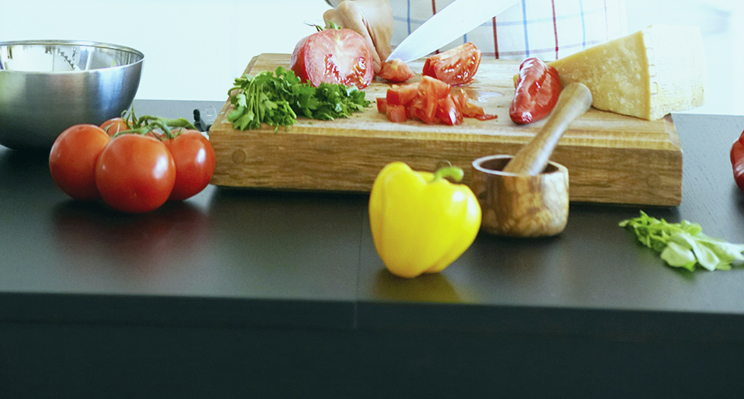Recipe and photograph – Dr Joan Ransley

This is a delicious, one pot, vegetarian dish which can be scaled up to feed a crowd. It also improves once cooked if left for a while before eating.
This stew contains a glorious mix of vegetables which are known to promote gut health. Eating a diverse range of plant foods increases the variety of beneficial microbes in the gut. Gut microbes are key to supporting many aspects of human health including immune, metabolic and neurological functions. Olive oil can have positive effects on gut microbiota due to the high levels of polyphenols they contain. Bacteria in the gut can transform polyphenols into useful biologically active compounds that influence the body’s immune system and many other aspects of health. Research has shown eating a moderate amount of cheese can increase Bifidobacteria, which are known for their positive health benefits through their metabolic activities.
Method
Place the onion in a large, wide pan and drizzle with a little olive oil. Sweat the onion for 5 minutes until soft. Add the garlic, spices and herbs, reserving a little of the parsley to finish the dish.
Turn up the heat and add the chopped tomatoes and tomato purée allowing the stew to come up to the boil. Reduce the heat and simmer for 20 minutes. Stir in the butter beans, green beans, lemon zest and lemon juice, and cook for a further 10 minutes. Cover the pan at this stage if you can otherwise stir to ensure the green beans cook through.
Serve the tomato and bean stew in bowls with crumbled feta cheese, pine nuts and a sprinkling of parsley.
Alternative serving suggestion
Any green vegetable can be substituted for the green beans for example, broccoli spears or asparagus.
This dish can be part of a tapas style meal served with bowls of freshly cooked prawns or chicken.
Cooks tips
- Use 500g of chopped fresh tomatoes instead of tinned chopped tomatoes.
- Any leftovers from this dish can be eaten the following day as the flavours improve over time.
| Per Serving (g) | Per 100g | |
|---|---|---|
| Calories (Kcal/KJ) | 535 / 2237 | 92 / 384 |
| Protein (g) | 28 | 4.8 |
| Fat (g) | 22 | 3.7 |
| Saturated fat (g) | 6.7 | 1.1 |
| Carbohydrate (g) | 47 | 8 |
| Sugar (g) | 13 | 2.2 |
| Fibre (g) | 20 | 3.4 |
| Sodium (mg) | 500.5 | 86 |
| Salt equivalent (g) | 1.3 | 0.22 |


